- Home
- Herbie Brennan
The Doomsday Box Page 6
The Doomsday Box Read online
Page 6
“You started it all up again?” Danny asked, incredulous.
“What else could we do?”
“Mr. Carradine,” Michael said, “what has this got to do with Montauk? I thought you told us Project Rainbow was about teleportation and time travel?”
Carradine had always thought of himself as a hard-bitten CIA man, who did what was necessary for the sake of the country and tried not to think too deeply about some of the consequences. But in the past he’d always been surrounded by fellow operatives who were just as hard-bitten. He took a deep breath. “You’re too young to remember the Cold War. Two superpowers . . . the constant threat of nuclear Armageddon . . . proxy wars . . . the arms race . . . the Cuban Missile Crisis . . . America was the only country strong enough to stand up for democracy and freedom, and sometimes, in our enthusiasm, we made mistakes.”
“Doesn’t answer his question,” Danny said.
Carradine said, “The official policy on germ warfare was to keep pace with the Soviets—just keep pace; no more than that. But there was a rogue element in the CIA who believed keeping pace would never be enough. They thought we needed more biological weapons than the Soviets, better biological weapons than the Soviets. They couldn’t influence the number of weapons we had—not if they wanted to keep their activities secret—but they believed they could influence the quality.”
“Quality?” Opal murmured. “You mean, how many people they could kill.”
Carradine ignored her. “I’m afraid certain members of that rogue element infiltrated Montauk. Actually, what I should say is that the rogue element quietly took it over.”
“What?” Danny asked. “Turned it into a germ warfare lab? Stopped messing around with time travel?”
“Nothing quite so obvious as that.” Carradine shook his head. “And actually, time travel and germ warfare aren’t a million miles apart.”
Fuchsia’s hand went up to her mouth. “Oh my God!” she exclaimed. “You don’t mean—?”
Carradine nodded. “We had an operative, code-named Cobra, who wormed himself into a position where he was virtually running the practical operations at Montauk—not the whole project, not the admin, but the whole experimental side. This gave him and his team control of the time travel experiments, meant he could do more or less what he wanted and fake the reports if necessary.” He hesitated, partly from reluctance, partly to see if the others had caught up, then said bluntly, “Cobra decided to investigate the possibility of using the Black Death in germ warfare.”
“You mean he wanted to bring back Black Death samples from the Middle Ages or something?” Danny asked, eyes wide.
But Michael was frowning. “Why would he need to? There’ve been recent outbreaks of bubonic plague in Asia.”
“And I would imagine there are laboratory samples with the World Health Organization or somewhere,” Opal said.
Carradine shook his head. “Actually, the Black Death wasn’t bubonic plague, as Fuchsia seems to have guessed. Some scientists are beginning to suspect that from historical evidence, and I can confirm it. Bubonic plague is a bacterial infection. The Black Death was a filovirus like Ebola. But Cobra wasn’t satisfied with that. He was obsessed with the idea of a mutation—something more virulent that would spread even more easily.” He hesitated, then said, “Cobra used the Montauk time gate—quite illegally—to search history for that mutation. Now it looks as if he found it.”
“You mean that’s what was in the box?”
“I told you Project Rainbow ran into problems in 1988—all that was true and had nothing to do with the germ warfare activities, which were very much a black op. I also told you President Reagan closed the whole place down in 1989. What I didn’t tell you was that it happened very quickly: Reagan was a decisive man. At the time we pulled the plug, Cobra was supposed to be on vacation. But that was just his cover. Only a handful of people knew he was actually on one of his time trips. The thing was, we didn’t know where, and there was no way to call him back. We couldn’t even try to stop the closure without revealing what he’d been doing. All we could do was hope he got back in time. But he didn’t. When the project closed, it left him trapped.”
“Wow!” Danny exclaimed.
Carradine said, “The sample box that came through when we reactivated the machinery was identical to the ones we were using in the eighties. I wasn’t expecting it, so I couldn’t warn the colonel in time. When he opened it, some of the vials were broken, which meant the virus was loose inside. The colonel caught it at once. After that, it was too late.”
“Back up a minute, Mr. Carradine,” Danny cut in. “The rest of us were in that chamber too—how come we haven’t all got it?”
Carradine smiled weakly. “That’s where this meeting started. That’s why I told you we weren’t going to die of the plague.” He sighed. “It’s the only good thing to come out of this whole mess. When Cobra and his black-op team first planned their little field trips, they realized how potentially dangerous they would be. So the first step in their plan was to develop a supervaccine that would stimulate the immune system so strongly it would fight off any infection. To this day, only a handful of CIA operatives know about the existence of that vaccine. I happen to be one of them. I’ve made sure it was included in the routine vaccinations of every active Shadow Project operative—a sort of atonement, I suppose. Have you noticed you haven’t gotten sick since you joined the team?”
Opal was staring at him with a look that combined shock and bewilderment. “If you have a supervaccine, can’t you use it to stop what’s happening now?”
“I wish I could,” Carradine told her. “First of all, a vaccine is designed to prevent a disease, not to cure it. Secondly, we don’t have nearly enough supplies to vaccinate an entire population.”
“Can’t you make more?” Danny asked.
Carradine shook his head. “Not in time. The mass manufacture of any vaccine from its development stage takes about six months on average. This one contains some very rare ingredients, which would slow the process down even further. The existing stockpiles would protect a few hundred people at most. The virus is currently spreading like wildfire. A global pandemic is a day or two away at most.”
“So there’s nothing we can do?” Opal was beginning to panic. “This Cobra person has sent some sort of superbug through time to help the American germ warfare program, and now it’s going to wipe out half the world?”
“That’s about the size of it, but there is something you can do,” Carradine said firmly. “If you’re prepared to accept the mission, you can go back in time and stop Cobra before he sends through the doomsday box.”
Chapter 15
Carradine, the Meeting Room, Montauk Underground Complex
All of us?” Opal asked.
“Yes.”
“Including you?”
Carradine shook his head. “I’ll have to stay here and operate the time-gate machinery, otherwise you have no way of getting back.”
Danny looked at him intently. “You want us to go back to the Middle Ages?”
They were moving toward the critical question already, and Carradine wasn’t sure he was prepared to answer it. “I don’t think so,” he said simply.
But Danny, of course, wasn’t going to leave it alone. “So how do we stop him?”
“Well,” Carradine told them, “the first thing to say is that Cobra isn’t a mad dog—he’s not some sort of Joker character fighting Batman. He might be misguided, but he didn’t plan to infect the world. So I figure—”
Fuchsia interrupted to ask, “What was Cobra’s real name, Mr. Carradine?”
It was something he didn’t want to get into at the moment. “He used different names. He spent most of his life undercover.” He glared impatiently at Fuchsia. “Anyway, I figure what we need to do—what you need to do—is get to him before he sends through his little doomsday box, let him know the results of his actions, make sure he understands what will happen if he goes ahead. On
ce he realizes he’s about to put the entire world in danger . . .” Carradine spread his hands. “As I said, he’s not a mad dog. He’ll never send the samples through after that.”
Danny asked, “So you do want us to go back to the Middle Ages?”
Carradine shook his head. “Forget the Middle Ages, Danny. First off, we don’t know where to find him in the Middle Ages—he could be anywhere from China to England—and we don’t even know exactly when. Once the project closed, we lost our lock on him. Second thing is, if you did go to that time frame, you wouldn’t survive a week. You don’t have the right clothes; you couldn’t even understand medieval English, let alone speak it. You don’t know the customs of the period, don’t know how to behave, don’t have any money. You’d have to steal food or starve, and the second time they caught you, they’d hang you.”
“What would they do the first time?” Danny asked.
“Cut your hand off,” Carradine said bluntly.
Danny held up his hand and stared at it fondly. “You’ve convinced me.”
But apparently he hadn’t convinced Opal, who said, “Cobra managed to survive. Obviously.”
“Cobra spent months—actually over a year—preparing for his first trip to the fourteenth century. He studied Middle English, Latin, and Old French. He read social histories of the time. He had clothes specially made in the style of the period. He had a purseful of genuine coinage. He carried medieval weaponry—sword and a dagger, as I recall—for his own protection . . . and he could use it: he went through a course of special weapons training. He had time to make his preparations and the resources of the CIA behind him. We have neither. Just about everybody at Montauk is dead or dying now, and there’s nobody on the outside riding to the rescue.”
Danny shrugged. “So if it’s not the Middle Ages, then when?”
Carradine placed both palms on the tabletop and leaned forward. “In theory, any time before he collects the samples. In practice, it has to be a time period where you can survive and move freely, where we know Cobra’s whereabouts, and ideally it should be a period where you can find a little help when you need it. And believe me, you’re going to need all the help you can get.”
“You obviously have a time period in mind, Mr. Carradine,” Michael said.
“The one year that checks all the boxes is 1962,” Carradine told them. “Or at least most of them.”
Opal echoed, “Nineteen sixty-two? Wouldn’t it make more sense to send us back to 1988 or whenever it was, just before Cobra made his trip to the Middle Ages? We know where to find him—here at Montauk, obviously—and the whole plan would be fresh in his mind.”
Carradine shook his head. “I’m afraid your chances of success here in the eighties would be as slim as your survival in the Middle Ages. What do you think would happen if the four of you turned up unannounced in a super-secret underground government project in the middle of the Cold War?”
“They’d cut our hands off?” Danny asked, deadpan.
“Maybe not, but it might take you a few years to get out of jail. Besides, even if you managed to reach Cobra, you have to remember he was in the middle of a black op, one he thought was vital for the future of the free world. He’d want to protect himself, and things could easily turn rough. At best, he wouldn’t be very likely to believe you.”
“Isn’t that a problem whenever we meet up with him?” Opal asked. “Not believing us, I mean?”
“Yes, it is. Frankly, I’d be far happier if we could pick a year closer to the time he got involved with the germ warfare thing, but I don’t have access to CIA records at the moment, so I don’t know where he was stationed at any given time. Except I happen to know he was at Langley in 1962 because his son was born that year. But sixty-two could be good, even though it isn’t perfect. He was more open-minded in the sixties,” Carradine said. “With the proper backup in sixty-two, he’s likely to believe you.” He hesitated. “I think.”
Fuchsia hadn’t spoken much. Now she did. “What do you mean by backup, Mr. Carradine?”
“We have a man in 1962.” Carradine sighed. He’d already revealed so many official secrets, the big one hardly seemed to matter. “All right, here’s the situation as I see it. You four may be working for the Shadow Project, but we’re now in the world’s greatest all-time god-awful mess, so I think I’m justified in officially co-opting you into the CIA. Project Rainbow was CIA, Cobra was CIA even though he was acting illegally, and it’s up to the CIA to clean things up now, so I can justify that decision. As members of the CIA, you’re bound by American secrecy laws just as tightly as you’re already bound by the British Official Secrets Act. Pass on anything I’ve told you, anything I’m about to tell you, and you’ll come out of jail about in time to draw your old-age pensions. Clear?”
“Clear,” Michael said calmly. After a moment, the others murmured their assent.
“When we finally got a reliable time gate working at Montauk,” Carradine went on, “senior management decided it would be a good idea to establish CIA stations at critical points of history. To keep an eye on things, so to speak, nudge events in the right direction. Obviously these stations had to be kept secret, so what most of them amounted to was one, maybe two agents in deep cover. Each functioned as our man on the spot in a particular time period. The CIA itself was set up in 1947 with headquarters in Washington. But in 1961, it transferred to Langley, Virginia. It was a hell of a move, lots of confusion, which gave us an opportunity to plant a temporal agent there: we had him safely in place by early sixty-two.”
“You mean,” Danny said incredulously, “the CIA infiltrated the CIA?”
“Essentially, yes,” Carradine told him soberly. “We thought it was important to have him in place in the light of subsequent events. Where better than CIA headquarters, where he could pose as an ordinary agent and have access to the intelligence materials of his day? But the important thing is, the setup gives you a point of contact if you’re looking for Cobra in 1962.”
“I don’t understand this, Mr. Carradine,” Opal said.
“It’s simple enough,” Carradine told them. “I can send you to 1962, somewhere close to Langley. From there—”
Danny asked, “Why not into Langley itself, since that’s obviously where we’re going?”
“There’s no way we want you appearing suddenly where you’re likely to be seen—people would start to ask too many questions,” Carradine explained. “Standard procedure is to transport you to a remote spot within reach of your ultimate target. You make your way from there. Once you reach Langley, I want you to go directly to CIA headquarters. When you get there, ask for Jack Stratford. You got that name?”
“Jack Stratford,” Michael murmured.
“Since you’ve no valid credentials, he’ll refuse to see you. At that point, you should instruct the receptionist to give him this.” He tossed a folded slip of paper onto the table. Opal picked it up and hesitantly opened it. The others leaned forward to see. On the paper was written the single word Chronos. “Then leave and make your way to Pete’s Pies and Coffee. It’s only a couple of blocks away; anybody will give you directions. Order yourselves coffees and anything else you want. Jack Stratford will join you inside fifteen minutes and pay the bill.”
“Jack Stratford is our man in 1962, right?” Danny put in.
“Right,” Carradine confirmed.
“What happens then?” Opal asked.
“Stratford will set you up to function in 1962, provide you with everything you need for your mission.” He hesitated, then added, “Providing you’re willing to undertake it.”
Chapter 16
Danny, the Meeting Room, Montauk Underground Complex
Okay,” said Carradine briskly when the rest of the briefing was finished, “get back to your individual quarters and get yourselves ready, then join me in the transportation chamber.” He caught the blank looks and added, “Where you saw the time gate: we called it the transportation chamber. For obvious reasons.”
As they pushed their chairs back, he said casually, “Danny, would you hold up a minute?”
“Sure.”
As the door closed behind the others, Carradine said thoughtfully to Danny, “You were brought up in a particularly rough area of London—right?”
“Rough enough,” Danny muttered tersely. He disliked talking about his past, even though he was aware Carradine knew all about it from his file. The question was, why was Carradine bringing it up now?
“Must have met some hard men,” Carradine said.
“A few.” Danny watched him suspiciously, wondering where this was going.
Carradine parked his backside on the edge of the conference table, the picture of relaxed confidence. Except he was neither relaxed, nor particularly confident. If Danny was reading him right, the casual pose was just an act. There was something on Carradine’s mind. Danny waited. Carradine glanced toward the strip light in the ceiling, looked back at Danny, then asked, “How did you deal with them?”
“Kept out of their way, mostly.”
“And when you couldn’t keep out of their way?”
Danny took a deep breath. “What are you asking me, Mr. Carradine? What are you asking me really?”
“Ever use a knife?”
“Cripes, Mr. Carradine! What’s this about?”
Carradine licked his lips. “Did it occur to you to wonder what will happen if we can’t persuade Cobra to abandon his plans?”
“Sure it did. But you said he’s not a mad dog.”
“He’s not. He’s not going to send the samples if they lead to the deaths of millions of Americans. I’m certain of that. What worries me is that he may not believe us.”
“That we’ve come from the future?” Danny asked. He supposed it did sound a bit far-fetched.

 Through the Wardrobe
Through the Wardrobe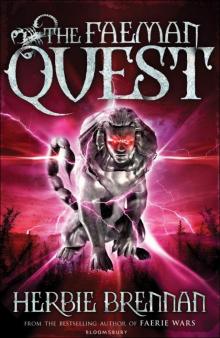 The Faeman Quest fw-5
The Faeman Quest fw-5 Faerie Lord
Faerie Lord Madame de Gaulle's Penis
Madame de Gaulle's Penis Faerie Lord fw-4
Faerie Lord fw-4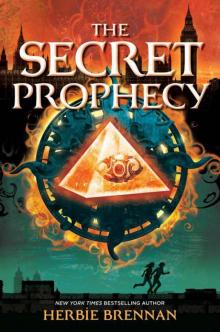 The Secret Prophecy
The Secret Prophecy Faerie Wars
Faerie Wars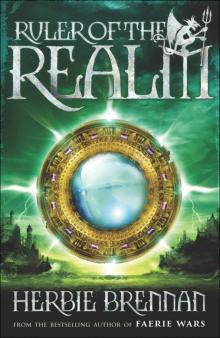 Ruler of the Realm
Ruler of the Realm GreekQuest
GreekQuest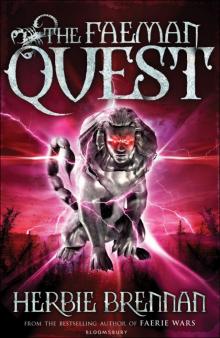 The Faeman Quest
The Faeman Quest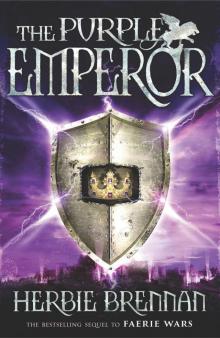 The Purple Emperor
The Purple Emperor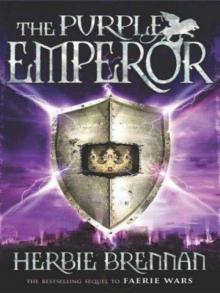 The Purple Emperor fw-2
The Purple Emperor fw-2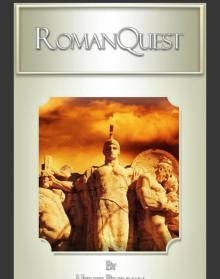 RomanQuest
RomanQuest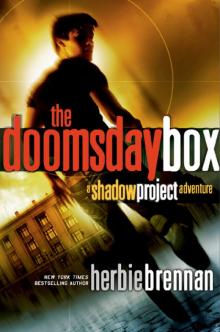 The Doomsday Box
The Doomsday Box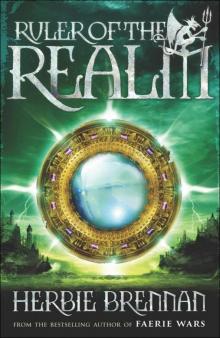 Ruler of the Realm fw-3
Ruler of the Realm fw-3 Faerie Wars fw-1
Faerie Wars fw-1